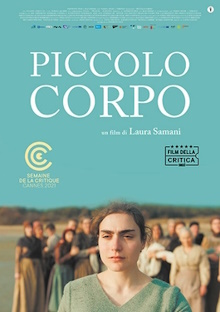This was the feature film debut of Laura Samani and pretty much everyone else in it are total unknowns as well. It’s very much the kind of film in which the filmmaker had to gather funds from many sources to make and at times visibly looks like it was shot with a not too expensive digital camera. Still, it successfully evokes an Italy of an earlier era and a world in which Christian miracles are real and are to be taken seriously. It’s a short film and there’s not too much going on in it but it’s effective and original so that’s enough.
On an island somewhere in Italy, a pregnant woman named Agata walks into the ocean as part of a ceremony with the other women of her community. Her child, a girl, is stillborn however as the corpse is buried before Agata is able to recover from her ordeal. She begs the local priest to name her but he is insistent that as she never drew a single breath, she cannot be granted a name according to Catholic tradition and her soul will be consigned to Limbo. An assistant however quietly leads her to a man who tells Agata about a sanctuary far to the north. There it is said that dead infants can miraculously be given life enough to take a single breath and so be given a name. When a fisherman who is presumably the father refuses to help, Agata sets out on her own with the wooden coffin strapped to her back. Soon after she arrives on the mainland, she runs into someone who presents as a young man and calls himself Lynx. Claiming that she will be lost if she travels by herself, he leads her to a village. However the villagers, realizing that her breasts have milk, wants to take her to a rich family to serve as a nursing maid instead, and this is only the beginning of her adventures.
The film doesn’t provide a specific date or place so it isn’t meant to be historically accurate. It is intriguing that at one point, some bandits find an electric lightbulb in a traveler’s belongings but are unaware of what it is, which effectively places this as being set some time in the 19th century. It’s enough to know that this is an era in which superstitions are rife and may well be true, travel is arduous and women are weak. Even with a limited budget, I’d say that it successfully transports the audience into another time and place. Even with as little as we get to see, we can already tell that Agata’s seaside community has its own customs and traditions, and these are completely different from the ones that Lynx is familiar with even if by our standards, they live so close to one another. Religion is a powerful, active presence in their lives and warnings about supernatural forces and spirits are to be taken seriously. In such a world, Agata’s quest to seek a name for her stillborn daughter makes complete sense as it is the only way that they would be able to be reunited in the afterlife.
Less obvious perhaps is how this film effectively highlights female agency and mutual support. In her home village, it is only the women who sympathize with and support Agata. At every step of her travels, it is again women who step in to offer her help. The film’s big twist is that even Lynx who presents as male was born female. I take it that Samani’s intention was to imply that women being natural mothers have a special love for infants and children. In the end, the film isn’t that deep but it is intense and that is good enough reason to recommend it. As an atheist, I have no personal affection for the subject matter, but I would agree that if the Christian doctrine were indeed literally true, Agata’s actions as shown here would in fact be rational.
